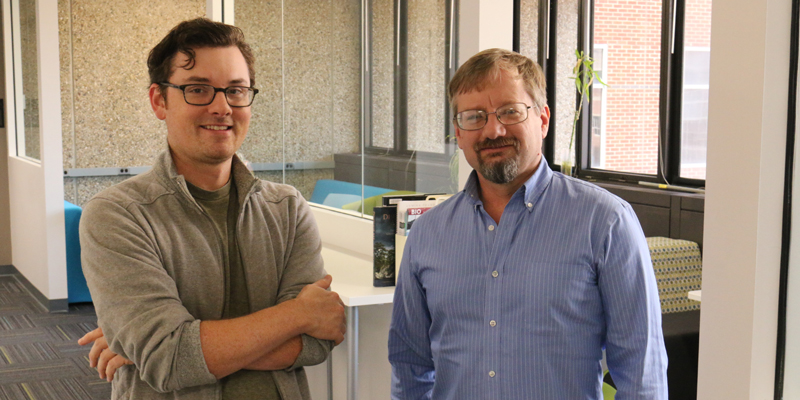Charlie Willis and Center for Online Biology Education collaborators aim to use experience in online education to push courses and web-based teaching forward.

Charlie Willis (left) and David Kirkpatrick (right) on the University of Minnesota campus.
Effective teachers know there’s more to helping students succeed than just showing up and teaching a lecture. To do their job well, they have to prepare coursework, reading materials and class activities, as well as grade papers and assignments while also mastering a knowledge of the content they expect students to gain during a course. For online educators like Charlie Willis, however, helping their students succeed involves additional challenges.
“There are innate challenges with teaching biology online, be it an introductory course or an advanced ecology course,” says Willis, a teaching assistant professor in the Department of Biology Teaching and Learning (BTL). “How best to translate the in-class experience to an online space is really not well understood. Not that it hasn't been tried, but the biology education research is still catching up.”
Willis is a part of that broader effort to catch up. He and colleagues across the University of Minnesota are in the midst of launching the Center for Online Biology Education (COBE), an effort to not only run online biology courses for students at the University and beyond, but also a space for educators to study and learn from each other on how to best teach online classes.
“COBE will provide a framework for online biology education, to better support current efforts and to provide flexibility as the field of online biology education expands and matures,” says BTL department head David Kirkpatrick. “With COBE as a central resource repository, we expect that creating new online courses will be easier and the resulting courses will better fit the needs of the undergraduates in CBS and elsewhere.”
Willis and his colleagues hope to take advantage of COBE to build collaborations and tackle the many unanswered questions in effective online education. With a few semesters of online course development under his feet, he already has a sense of what generally has worked with big aspirations for what he and colleagues can find out through the Center.
“In face-to-face courses, you adjust lectures as you go and update students in-class, all at once. Online, students engage the material at different times and rates, and so everything must be ready to go at the start,” Willis says. “I’m hoping through my work with COBE that I expand existing online course offerings and create new ones that work best for students online.”
-Lance Janssen